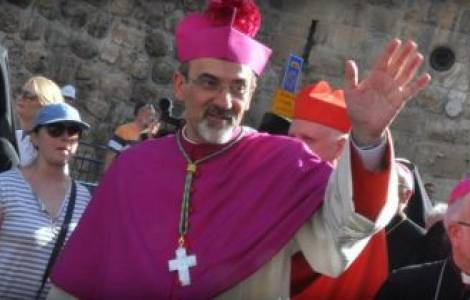
lpj.org
Jerusalem (Agenzia Fides) - Lent is "a new beginning, a path leading to the certain goal of Easter, Christ’s victory over death". Even the Latin Patriarchate of Jerusalem, in this delicate moment of its history, is called to a change of pace, a restart, after "mistakes and wrong decisions have been made which have affected the life of the Patriarchate, financially and administratively, mainly concerning the American University of Madaba". It is a letter written in a spirit of genuine frankness, that the Archbishop Pierbattista Pizzaballa OFM, Apostolic Administrator of the Latin Patriarchate of Jerusalem, addressed to all members of the diocese he administers.
A Message which takes its title from the second Letter of St. Paul to the Corinthians ("We have this treasure in earthen vessels"), and that, at the beginning of the Lenten journey, offers Archbishop Pizzaballa the occasion to frankly explain some reasons which on July 15 led Pope Francis to appoint him apostolic Administrator. "For 170 years", reads Pizzaballa’s letter "this Patriarchate has played and still plays an important role in the life of the Christians in the Holy Land. Our parishes, schools and many other institutions have contributed much to the life of the Christians in these lands and have strengthened our witness to Christ and his Resurrection from the dead. However, we all know that the naming of an Apostolic Administrator, someone from outside the Patriarchate clergy, was an unexpected decision, and it came as a surprise shock to many. It led to the conclusion that all is not well. Indeed, mistakes have been made and wrong decisions have been made which have affected the life of the Patriarchate, financially and administratively, mainly concerning the American University of Madaba. We had failed in some important areas, perhaps not focused enough on our primary mission: preaching the Gospel and dedicate ourselves to the pastoral activities".
The incident referred to by Archbishop Pizzaballa is the American University of Madaba, AUM, affiliated University of the Latin Patriarchate of Jerusalem, and the first stone on May 9, 2009 was blessed by Pope Benedict, and was inaugurated on May 30, 2013 in the presence of King Abdallah II. At the end of 2014, the Holy See had to intervene to take charge of administrative and financial problems that had marked the construction and startup of the academic institution. An ad hoc committee, established by the Secretary of State, had in turn entrusted a local Committee of administrators, chaired by Archbishop Giorgio Lingua, Apostolic Nuncio in Jordan, the "task to follow and coordinate closely, until July 2015, the works of the University".
On the problems and emergencies experienced by the Latin Patriarchate, Apostolic Administrator Pizzaballa convened a gathering of all the diocesan priests of the Latin Patriarchate in late February. Archbishop Pizzaballa's letter contains several references to that gathering he had with the clergy of the Patriarchate in the House of the Visitation of the Sisters of the Rosary in Fuheis, Jordan, where "two days were spent together in deep and meaningful discussion about our beloved Patriarchate, about our vocation and mission but also about the mistakes that have led us to a critical situation, mainly financial". The Archbishop stresses that "now is the time to begin the work of reform, reconstruction and renewal in certain sectors of our administration, but not only". He mainly invites "to focus even more on our pastoral activities", recalling the decision "to open, for instance, new diocesan offices for the pastoral work, which will coordinate and unify our pastoral service to the community". "We, bishops and priests in the Patriarchate", recognizes the Apostolic Administrator "are among the sinners who implore God’s mercy and beg for the grace of conversion. Our mistakes and wrong judgments are clearly set before our eyes, like the repenting Psalmist says. We must admit that we are like cracked and broken clay vessels. We were entrusted with much but in our human fragility, we allowed much to be wasted. Yet we know that the Lord uses vessels that are fragile and providential tools in His plan of salvation". (GV) (Agenzia Fides 04/03/2017)